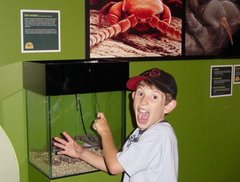This from Evangeline Reed:
I am currently a graduate student at the University of Southern California. I am getting my Master of Arts degree in Communication Management, and I am in the midst of deciding on a topic for a research paper. I have always been fascinated with the museum/nonprofit-audience relationship, and I have a general sense of what my paper may focus on. Here are the abstract questions that I used to brainstorm my topic (in no particular order):
- What are the most effective forms and/or uses of communication for arts organizations to build and develop new audiences?
- What is the role social media plays in arts marketing and communication and how large is this role?
- How are arts organizations/non-profits communicating to America's youth in order to attempt to attract future loyal patrons and donors?
I will be focusing on young professionals between the ages of 22-34. As of now I am planning on conducting various surveys and research methods to find out how this demographic uses social media, what social media they use, and for what
purposes. These questions will hopefully lead me to find out if social media is a main channel for cause-related information. After conducting my research my goal is to have a fully developed resource of the most efficient forms of media in order to reach my target demographic.
Wow! What an important set of questions. Evangeline, there is quite a lot of work going on in this area. I'm giving a paper (with my colleague Angelina Russo) at Museums and the Web 2008 on this very topic (well kind of). The paper, From ladders of participation to networks of participation: museums and social media, discusses a variety of evaluations I have conducted. One specifically targeted adults aged 18-30, what they were doing online and how museums might want to engage them via social media. Due to (umm) "technical difficulties" the paper isn't on the M&W website yet but can be downloaded from my audience research wiki. In that paper we also report data on how Australian use the Internet and compares usage to the US, drawing on information from a Forrester Research study that Seb Chan blogged about on fresh+new(er).
My initial reaction to your methodology is to actually use the tools of social media to conduct your research. There are some very interesting things happening on Facebook with a range of museums and galleries trying it out as ways to both engage and promote themselves with current and new audiences. I'd encourage you to join up, become a fan/join some groups and see where it takes you. I also found quite an interesting group on another social networking site called ning. The Dallas Museum of Art Junior Associates Circle is "... an exciting, under-40 group that hosts an exclusive set of social events and educational programs throughout the year."
Also, just as I was about to upload this post, my colleague Janet sent me a link to what looks to be a very interesting review – Tools for Culture: The Resonance & Use of Online Tools in the Cultural Sector – which may be relevant to your study? I haven't looked through it in any detail yet.
And another article from the New York Times I was just sent (gosh I'm glad I didn't upload this post earlier) – Museums Refine the Art of Listening which talks about the new tools art museums in particular are using to listen to their visitors.


